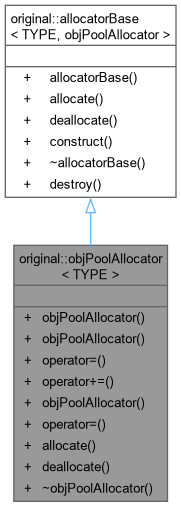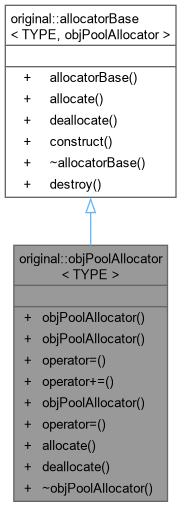original::objPoolAllocator< TYPE > Class Template Referencefinal
Object pool allocator for efficient fixed-size memory management. More...
#include <allocator.h>
Inheritance diagram for original::objPoolAllocator< TYPE >:

Collaboration diagram for original::objPoolAllocator< TYPE >:

Public Types | |
| using | propagate_on_container_move_assignment = std::true_type |
| Allows propagation on move. | |
| using | propagate_on_container_swap = std::true_type |
| Allows propagation on swap. | |
| using | propagate_on_container_merge = std::true_type |
| Allows propagation on merge. | |
 Public Types inherited from original::allocatorBase< TYPE, objPoolAllocator > Public Types inherited from original::allocatorBase< TYPE, objPoolAllocator > | |
| using | propagate_on_container_copy_assignment |
| No propagation on copy. | |
| using | propagate_on_container_move_assignment |
| No propagation on move. | |
| using | propagate_on_container_swap |
| No propagation on swap. | |
| using | propagate_on_container_merge |
| No propagation on merge. | |
| using | rebind_alloc |
| Rebinds allocator to different type. | |
Public Member Functions | |
| objPoolAllocator (u_integer size_class_count=8, u_integer count=4) | |
| Constructs a new object pool allocator. | |
| objPoolAllocator (const objPoolAllocator &)=delete | |
| Copy construction disabled. | |
| objPoolAllocator & | operator= (const objPoolAllocator &)=delete |
| Copy assignment disabled. | |
| objPoolAllocator & | operator+= (objPoolAllocator &other) |
| Merges another pool allocator into this one. | |
| objPoolAllocator (objPoolAllocator &&other) noexcept | |
| Move constructor. | |
| objPoolAllocator & | operator= (objPoolAllocator &&other) noexcept |
| Move assignment operator. | |
| TYPE * | allocate (u_integer size) override |
| Allocates memory from the pool. | |
| void | deallocate (TYPE *ptr, u_integer size) override |
| Returns memory to the pool. | |
| ~objPoolAllocator () override | |
| Destructor - releases all allocated memory. | |
 Public Member Functions inherited from original::allocatorBase< TYPE, objPoolAllocator > Public Member Functions inherited from original::allocatorBase< TYPE, objPoolAllocator > | |
| constexpr | allocatorBase () |
| Constructs a new allocatorBase instance. | |
| void | construct (O_TYPE *o_ptr, Args &&... args) |
| Constructs an object in allocated memory. | |
| virtual | ~allocatorBase ()=0 |
| Virtual destructor. | |
Additional Inherited Members | |
 Static Public Member Functions inherited from original::allocatorBase< TYPE, objPoolAllocator > Static Public Member Functions inherited from original::allocatorBase< TYPE, objPoolAllocator > | |
| static void | destroy (O_TYPE *o_ptr) |
| Destroys an object without deallocating. | |
Detailed Description
template<typename TYPE>
class original::objPoolAllocator< TYPE >
class original::objPoolAllocator< TYPE >
Object pool allocator for efficient fixed-size memory management.
- Template Parameters
-
TYPE Type of objects to allocate
Implements a memory allocator using an object pool pattern with these characteristics:
- Organizes memory into power-of-two sized chunks (1, 2, 4, 8, 16, 32, ... bytes)
- Maintains separate free lists for each chunk size
- Allocates memory in blocks (chunks) to reduce fragmentation
- Falls back to allocators::malloc/ allocators::free for allocations too large for the pool
Memory Management Approach:
- The allocator maintains multiple free lists, one for each size class (power-of-two)
- When an allocation request comes in:
- Finds the smallest size class that can satisfy the request
- If no free chunks available, allocates a new block of chunks
- For requests too large for the largest size class, uses global new
- When memory is deallocated:
- Returns the chunk to its appropriate free list
- Large allocations (outside pool) are freed immediately
- Note
- For large allocations, uses allocators::malloc/ allocators::free
Constructor & Destructor Documentation
◆ objPoolAllocator() [1/2]
template<typename TYPE>
|
explicit |
Constructs a new object pool allocator.
- Parameters
-
size_class_count Number of size classes to manage (default=8 → indices 0-7) count Initial number of chunks per size class (default 4)
◆ objPoolAllocator() [2/2]
template<typename TYPE>
|
noexcept |
Move constructor.
- Parameters
-
other Allocator to move from
- Note
- Transfers ownership of all resources and leaves source in initialized state
Member Function Documentation
◆ allocate()
template<typename TYPE>
|
overridevirtual |
Allocates memory from the pool.
- Parameters
-
size Number of elements to allocate
- Returns
- Pointer to allocated memory
- Exceptions
-
allocateError When memory allocation fails
- Note
- For large allocations, falls back to global operator new
Implements original::allocatorBase< TYPE, objPoolAllocator >.
◆ deallocate()
template<typename TYPE>
|
overridevirtual |
Returns memory to the pool.
- Parameters
-
ptr Pointer to memory to free size Number of elements originally allocated
- Note
- For large allocations, uses global operator delete
Implements original::allocatorBase< TYPE, objPoolAllocator >.
◆ operator+=()
template<typename TYPE>
| original::objPoolAllocator< TYPE > & original::objPoolAllocator< TYPE >::operator+= | ( | objPoolAllocator< TYPE > & | other | ) |
Merges another pool allocator into this one.
- Parameters
-
other The allocator to merge
- Returns
- Reference to this allocator
Merges:
- Size class configurations (takes maximum)
- Free lists (concatenates)
- Allocated blocks (combines)
- Allocator resources (since propagate_on_container_merge is true)
◆ operator=()
template<typename TYPE>
|
noexcept |
Move assignment operator.
- Parameters
-
other Allocator to move from
- Returns
- Reference to this allocator
- Note
- Releases current resources before taking ownership of new ones Leaves source in initialized state via poolInit()
The documentation for this class was generated from the following file:
- src/core/allocator.h
Generated by